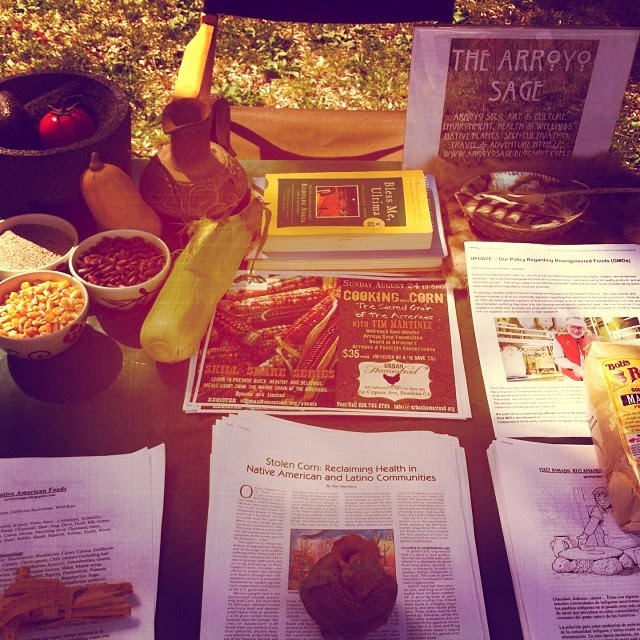“Fox” Orozco, an Aztec Dancer, was one of the first people to greet me. I took in the smell of the white sage he was smudging to "start the day off right,” and gave him a brief description of my writings promoting the importance of returning to a traditional diet. When I visited his booth later in the day, I was grateful to hear that he really appreciated my article, Stolen Corn.
 |
| SLOLA’s beautiful heirloom corn. |
The Seed Library of Los Angeles was an organization that I had just learned about, and I was excited to chat with them. SLOLA’s mission is to preserve genetic diversity and increase food justice and food security by saving heirloom seeds, and by creating a local community of seed-saving gardeners. A beautiful selection of native corn seeds were on display at their table, and David King, SLOLA’s board chair, was knowledgeable and enthusiastic about sharing their great variety and diverse culinary uses.
It was nice to have my friend Samyrha stop by and visit, along with one of her friends from the nearby community garden Proyecto Jardin. They had just harvested some beautiful, heirloom corn from their garden - huge and multicolored. We shared a pot of quinoa and ate from improvised corn-husk spoons as we talked and caught up.
 |
| Samyrha hanging at the Arroyo Sage table. |
I was happy to find another friend, Dennis Uyat, setting up a table for Comida No Bombas next to me. Dennis is an old garden-club buddy from Pasadena City College, and another member of Proyecto Jardin. He’d told me before of his work with Comida No Bombas, but I became very impressed after learning more.
 |
| Always good catching up with Dennis. Such a good dude! |
Comida No Bombas is a collective of young people who deliver free, vegan meals to folks in need - by bicycle! They use food that otherwise would have been wasted, and wrap it in biodegradable packaging. While other organizations provide food of questionable salubrity, in styrofoam packaging, with plastic utensils which end up as litter on the ground - Comida No Bombas seems to have all the right bases covered. Their model benefits our environment, our health, and our society - and should be replicated in every city, nationwide.
I enjoyed other interesting conversations with people throughout the day - all to the backdrop of Danza Mexica Cuauhtemoc’s dancing and ceremony. A volunteer with the Seed Library shared how a family history of farming inspired her to preserve biodiversity. Another woman shared her knowledge of natural, Mexican remedies for colds and injuries. Anet Aguilar, of the Facebook page Yo Soy Maiz, discussed with me the importance of identifying sources of non-GM masa and corn for the Latino community.
The issue of preserving the genetic integrity of natural, non-GM corn is an issue of preserving cultural identity. After learning the disadvantages of genetically modified corn, I resolved to avoid it as much as possible. Unfortunately, this also meant avoiding and losing a part of my culture. Fond memories of my Nana making tamales, and of eating my favorite ones (tamales dulces!) returned to me. Before finding non-GM alternatives, I felt a sense of loss that I would not eat those foods again.
Attending the Xilonen festival left me encouraged that a desire to preserve the living heritage of natural, non-GM corn is growing. Embracing the health-giving foods of our ancestors, voting with our lifestyle, and opting out of the industrialized food system in favor of sustainable agriculture has the power to impact our health and environment for the better - and in ways that are far more powerful than casting a vote at the ballot box.






This is undoubtedly the most special event venue in the city. We had 6 passed appetizers with the Liguria table which consisted of steamed veggies and fruits and breads.
ReplyDeleteHouston Venues